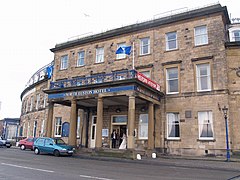North Euston Hotel
| North Euston Hotel | |
|---|---|
 |
|
|
Location within Fleetwood
|
|
| General information | |
| Location | Fleetwood, Lancashire, England |
| Coordinates | 53°55′40.8″N 3°0′33.12″W / 53.928000°N 3.0092000°WCoordinates: 53°55′40.8″N 3°0′33.12″W / 53.928000°N 3.0092000°W |
| Opening | 1841 |
| Owner | Spearman family |
| Design and construction | |
| Architect | Decimus Burton |
|
Listed Building – Grade II
|
|
| Designated | 26 April 1950 |
| Reference no. | 1362181 |
The North Euston Hotel is a hotel in Fleetwood, Lancashire, England. It was built 1840–41, to a design by Decimus Burton. During the second half of the 19th century, the building was used by the War Department as a School of Musketry; by the end of the century it had reverted to its original purpose. The hotel has been designated a Grade II listed building by English Heritage.
Fleetwood was a 19th-century planned town, developed by local landowner Peter Hesketh-Fleetwood. Inspired by southern English seaside resorts like St Leonards-on-Sea, Hesketh-Fleetwood employed architect Decimus Burton to lay out his new town and design the main buildings. Hesketh-Fleetwood intended that Fleetwood would be an important stop for rail passengers travelling from London to Scotland; in the 1840s, there was no railway over the Lake District hills and passengers would be able to disembark at Fleetwood before taking a boat to Scotland. A hotel was a vital part of this plan and since rail passengers would be embarking at London Euston, Hesketh-Fleetwood decided to name it the North Euston Hotel.
Burton designed the hotel as a focal point in the town. Construction started in 1840 and it opened the following year. A regatta was held in celebration of the hotel's opening in August 1841. The hotel's first manager was a Corsican man called Xenon Vantini. By the 1850s, a direct rail route to Scotland had been built, ending Hesketh-Fleetwood's hopes of Fleetwood becoming a major transport hub. The town's tourist industry was failing and the North Euston was sold to the government. From 1861–1867 the War Department used it as a School of Musketry. Later, with additional buildings, it was converted into Euston Barracks. In 1898 the North Euston reverted to its original purpose.
...
Wikipedia

